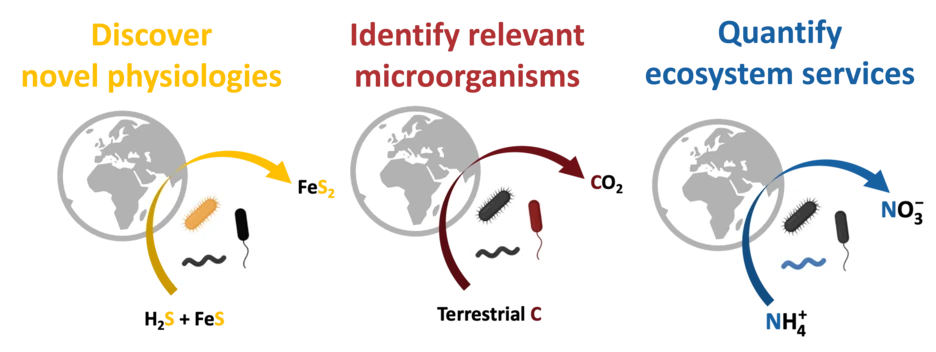Chair of Microbial Physiology
Welcome to the Chair of Microbial Physiology
Welcome to the fascinating world of microorganisms! Most people associate with microbes diseases, but pathogens represent only a minor fraction of known microorganisms. Most of them are actually very important in their interplay with biogeochemical cycling and ecosystem services. We are particularly interested in ecosystem services that microorganisms provide to humans and how microorganisms interconnect carbon, nitrogen and sulfur cycling in terrestrial and aquatic ecosystems. Our research aims to identify microbial key players driving the major biogeochemical cycles, quantify their in situabundance and activity, and investigate their physiology. Our interests encompass new metabolic functions and pathways, as well as the enrichment and isolation of novel microorganisms.

Key publications
Dyksma S., Pester M.: Growth of sulfate-reducing Desulfobacterota and Bacillota at periodic oxygen stress of 50% air-O2 saturation. Microbiome 2024; 12: 191. Abstract
Dyksma S., Pester M.: Oxygen respiration and polysaccharide degradation by a sulfate-reducing acidobacterium. Nature Communications 2023. 14: 6337. Abstract
Ngugi DK, Salcher MM, Andrei A-S, Ghai R, Klotz F, Chiriac M-C, Ionescu D, Büsing P, Grossart H-P, Peng X, Priscu JC, Salmor A, Pester M: Postglacial adaptations enabled colonization and quasi-clonal dispersal of ammonia-oxidizing archaea in modern European large lakes. Science Advances (2023); 9: eadc9392. Abstract
Diao M, Dyksma, S., Koeksoy, E., Ngugi, D.K., Anantharaman, K., Loy, A., and Pester, M. (2023) Global diversity and inferred ecophysiology of microorganisms with the potential for dissimilatory sulfate/sulfite reduction. FEMS Microbiology Reviews 47: fuad058. Abstract
Klotz F, Kitzinger K, Ngugi DK, Büsing P, Littmann S, Kuypers MMM, Schink B, Pester M: Quantification of archaea-driven freshwater nitrification from single cell to ecosystem levels. The ISME Journal 2022; 16: 1647-1656. Abstract